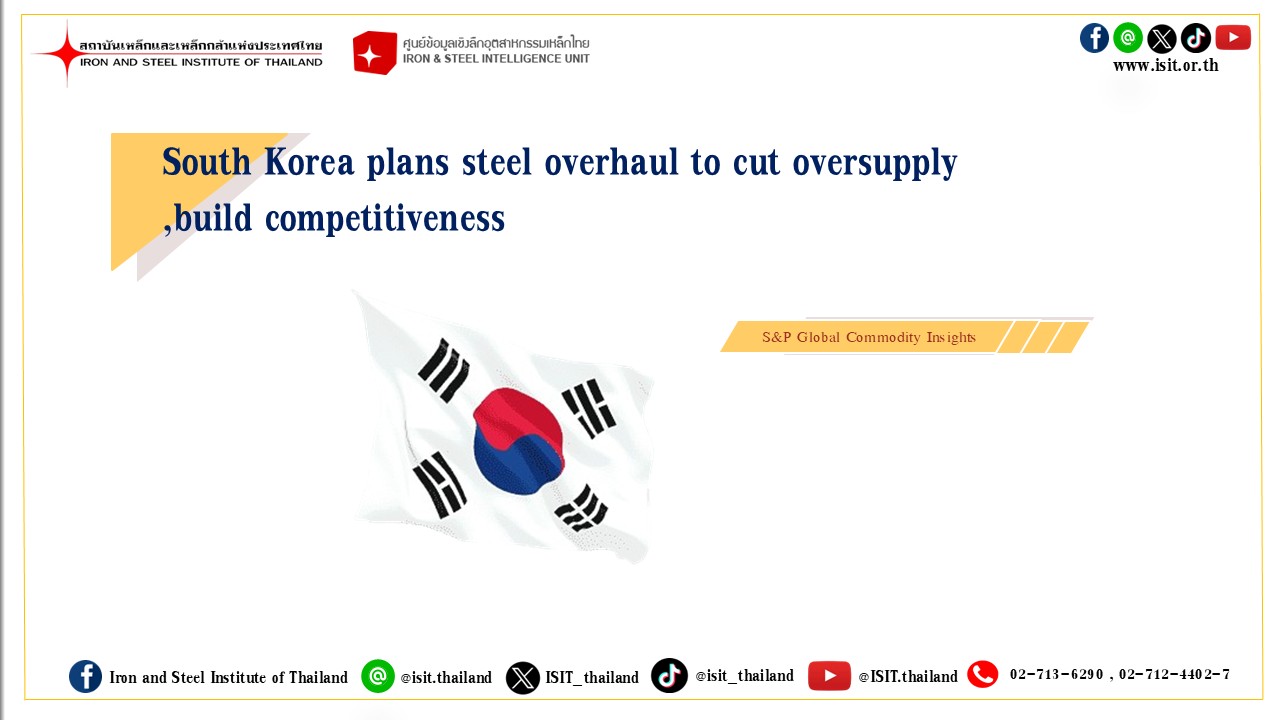
South Korea unveiled a road map to restructure its domestic steel industry, which includes cutting oversupply of certain steel products, the Ministry of Trade, Industry and Resources said Nov. 4.
The ministry stated that, under the "Steel Industry Advancement Plan" announced the same day, the South Korean government aims to reduce excess steel capacity and enhance future competitiveness.
The plan laid out four main measures, such as "facility adjustments, trade responses, high value-added and low-carbon transitions and expanded win-win cooperation," the ministry said.
Facility adjustments : "The government has proposed three principles for the adjustment of steel facility scales," the ministry said.
The government is supporting companies with "plans for facility adjustments among items where competitiveness is weakening and oversupply is intensifying (eg, structural steel and pipes)," it said.
Secondly, the ministry said, "In cases where market self-adjustment is difficult and the penetration rate of imported materials is low (for example, rebar), the government will create conditions to facilitate voluntary business restructuring."
Thirdly, "For items where competitiveness is expected to be maintained and the oversupply conditions are favorable (for example, electrical steel sheets and special steels), proactive investments will be made," the ministry said.
"For other oversupplied items such as hot-rolled, cold-rolled and galvanized steel, it will prioritize responses to imported materials and then review gradual facility scale adjustments based on the effects observed," it said.
Trade responses : The ministry said the government will "systematically respond to overseas export barriers and unfair domestic imports."
Consultations will be conducted regarding "US steel tariff of 50% and the EU's proposal to convert safeguards into [tariff-rate quotas]," the ministry said.
Additionally, the government will promote measures to enhance access to policy financing for steel, aluminum, copper and derivative product companies.
The measures will see the establishment of a "Steel Export Supply Chain Strengthening Guarantee Product" worth Won 400 billion ($277.86 million) and a "Secondary Compensation Project for Steel, Aluminum, Copper and Derivative Products" worth Won 150 billion.
The monitoring of steel imports using mandatory quality inspection certificates announced March 19, will be implemented starting in 2026, it said.
Other responses include strengthening customs management to prevent antidumping tariff evasion through third countries and bonded zones, which involves revising the Customs Act, mandating the reporting of raw material taxes and shortening patent periods.
Transitions : "To secure a future market for special carbon steel, a road map for R&D will be established, and through support worth Won 200 billion, the government aims to secure world-class technology and production capacity," the ministry said.
The government has selected the special carbon steel sector as one of the 15 leading projects in its "New Government Economic Growth Strategy," it said.
Under the low-carbon steel approach, the government will support the expansion of green competitiveness.
"Efforts will continue to establish low-carbon steel standards and certification systems and create a foundation for demand for low-carbon steel materials," the ministry said.
According to the ministry, support will be expanded for hydrogen reduction steelmaking, including the development of incentive measures to ensure sufficient access to economically viable clean hydrogen, in collaboration with relevant ministries such as the Ministry of Climate.
To ensure the secure supply of ferrous scrap, a key raw material for electric furnaces, "the government plans to prepare a 'Steel Scrap Industry Promotion Plan' in collaboration with the Ministry of Climate," it said.
The government will also review measures to prioritize the domestic use of waste aluminum cans and strengthen crackdowns led by the Customs Service to eradicate the illegal export of copper scrap, the ministry said.
Win-win cooperation : "During the restructuring process of the industry, including facility scale adjustments and low-carbon transitions, the impact on the local economy of steel industry clusters, which are highly dependent on the steel industry, is inevitable," the trade ministry said.
The government will promote investments in steel and related industries that achieve both short-term employment and long-term enhancement of steel competitiveness in steel industry clusters, the ministry said.
"The government aims to use this plan as a turning point for a new leap in the steel industry, proactively responding to the structural crisis of the industry and promoting the enhancement of future competitiveness," it said.